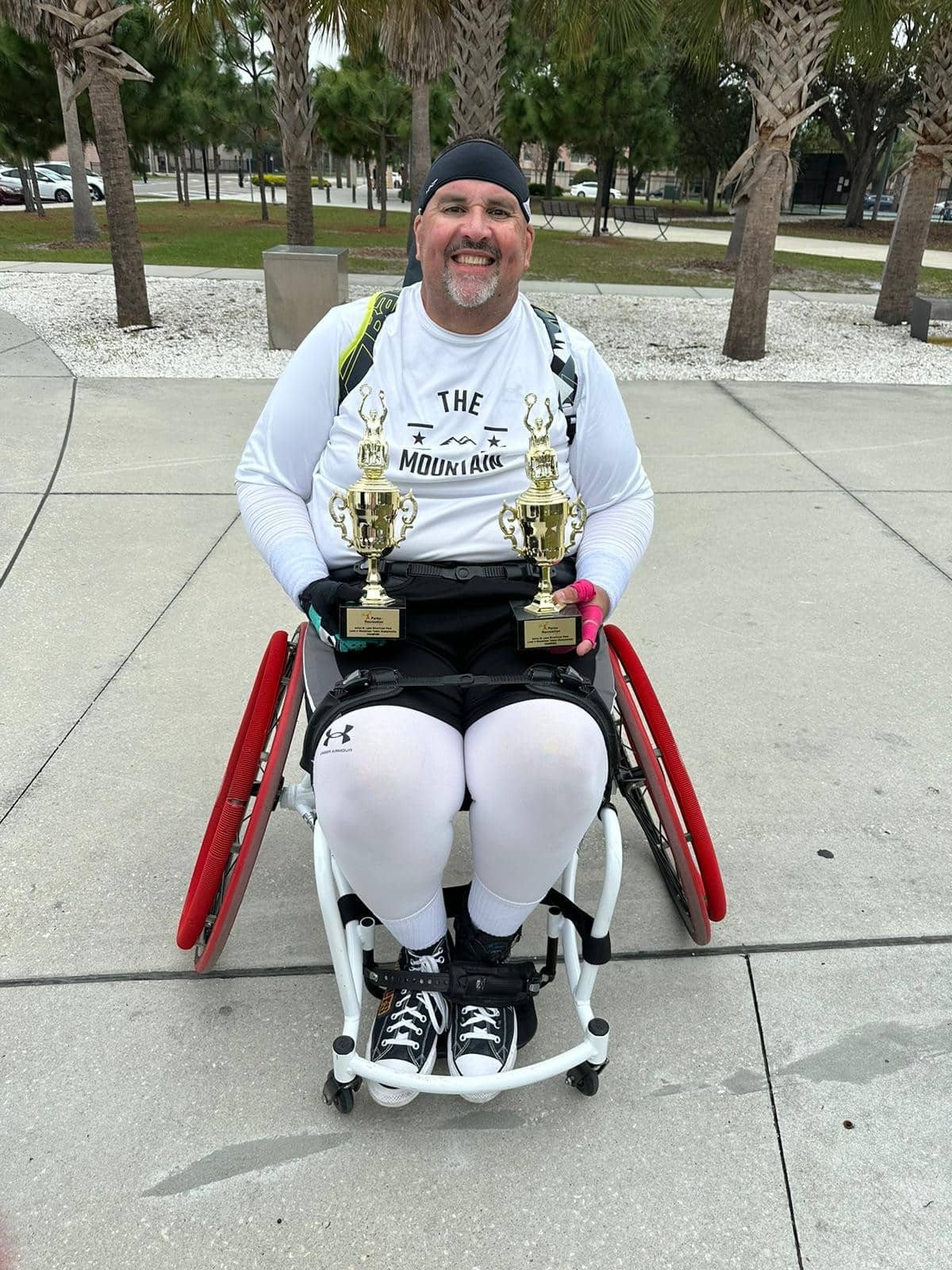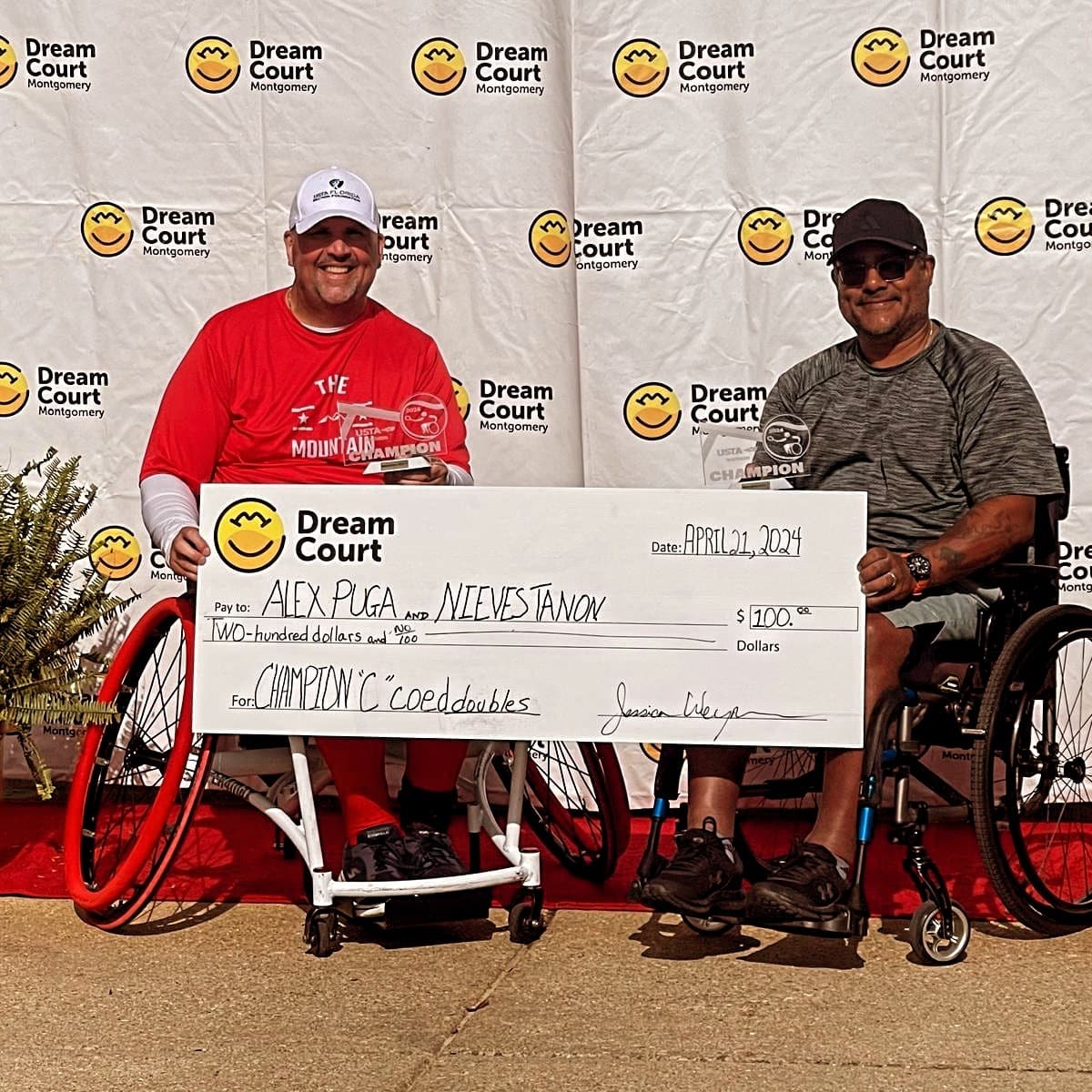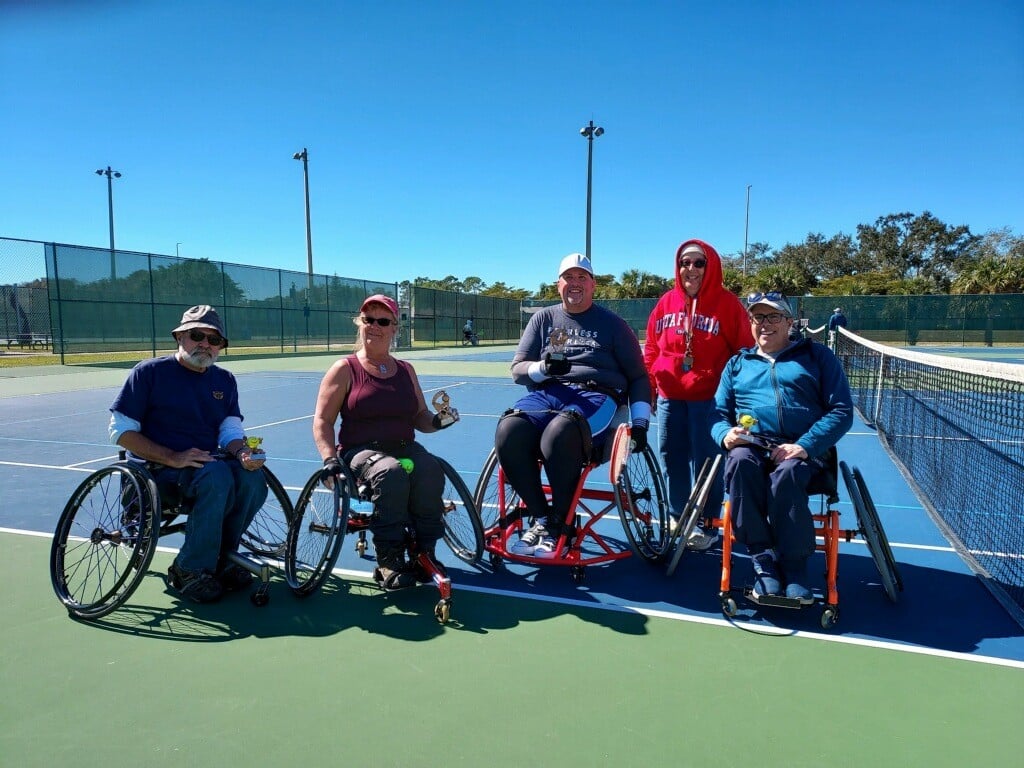Celebrating Disability Pride Month: Alexander Puga
Jul 11, 2025
In honor of Disability Pride Month, USTA Florida is proud to spotlight the incredible journey of wheelchair tennis athlete and volunteer Alexander Puga. A two-time cancer survivor, adaptive athlete, and proud disability advocate, Alex, affectionately known as “The Mountain” for his 6-foot-7 frame, embodies perseverance, passion, and the power of sport to build community.
Alex’s journey began on October 16, 1996, when severe back pain led to the discovery of a malignant tumor wrapped around his spinal cord. “I spent 15 hours in the operating room, completed 6 months of chemotherapy and radiation, and had to learn to walk again,” he said. “October 16, 2025, will mark my 29th year of cancer freedom from that surgery.”
In 2003, he faced another diagnosis—testicular cancer. Thankfully, after surgery and radiation, he’s now 22 years cancer-free. But the challenges didn’t stop there.
After years of battling weight gain due to treatment and medication, Alex underwent gastric sleeve surgery in 2016 and lost 235 pounds in 11 months. Then, in 2019, severe osteoarthritis led to double hip replacements, and drop foot, which appeared without explanation.

Photo credit: USTA Florida.
“After two successful hip replacement surgeries, I found myself not being able to play regular sports, and that’s when my life changed forever,” he said. “I researched adaptive sports, started by trying wheelchair basketball first, and then shortly after, I realized that there was wheelchair tennis. On September 26, 2021, I attended a wheelchair tennis clinic given by Coach Jim Tierney and the rest is history.
Alex participated in his first USTA Tournament in Fort Myers, where he was paired up with another wheelchair athlete from North Florida. “I had never played in a wheelchair tennis tournament before,” he said. “My goal for this tournament was to win one set either in singles or doubles. I won my first singles match while my partner and I won the C-Doubles division. It couldn’t have been better scripted. My first tournament and my first ever Wheelchair tennis trophy.”
Today, Alex uses a foot brace and walker to get around, but when he’s on the tennis courts, he utilizes a wheelchair and enjoys every moment. With just around four years of wheelchair tennis experience, Alex has found a deep passion for the sport, not just as a player, but as an advocate as well.
With that passion he has on the court, Alex shares it with everyone around him and has become a true advocate for the sport. “I volunteer whenever I can, whether it’s Kids Day at the Delray Beach Open or anywhere all-over South Florida.” “If I ever run into anyone disabled, I ask if they play adaptive sports, and if they aren’t I ask if they are willing to learn.”
 Photo credit: USTA Florida.
Photo credit: USTA Florida.
His efforts are driven by a powerful belief in access and awareness. “We are the lucky ones, because there are so many disabled and adaptive people in the world, who either don’t know about tennis and other sports or have no one to show them.”
For Alex, wheelchair tennis is a source of empowerment and healing. “Wheelchair tennis has made me an athlete again,” he said. “I hadn’t played any sports since October of 1996, when I had my first of two cancers. My ‘Never Give Up’ attitude never stopped me from always pushing forward.”
Alex also pushes that wheelchair tennis is for anyone, no matter their age, height, ability, or experience in tennis. “I am not your typical wheelchair tennis player,” he explained. “I am 6 feet 7 inches tall and 300 pounds. I describe myself as an offensive lineman playing wheelchair sports.”

Photo credit: USTA Florida.
He continues to push for visibility and inclusion in the tennis world. “It’s a common misconception that we are not real athletes,” Alex said. “Once the public watches our exhibitions, they realize how difficult it truly is to be a wheelchair athlete.” Alex would love to see more Major Tennis Tournaments around the world host wheelchair exhibitions so others can become emerged and educated on the aspects of adaptive sports.
Disability Pride Month holds deep meaning for Alex. “It’s being able to talk about the pride each of us adaptive athletes feel, by being able to participate and thrive in our adaptive sports,” Alex said. “It gives us an outlet for stress, exercise and just enjoyment of getting outdoors or indoors, meeting people from all over the world and still getting to enjoy the gamer of tennis and other sports.”
As a wheelchair athlete, Alex doesn’t see himself at a disadvantage than someone else, he keeps a positive mindset and tells everyone that he and other adaptive athletes just have a different skillset. “I think of us as not disabled, but differently abled. Anything able-bodied athletes can do, we can also do, just differently.”

Photo credit: USTA Florida.
Alex is also grateful for all the volunteers that help make wheelchair tennis accessible for everyone. “Volunteers play a huge role in keeping our sports alive and thriving. Win or lose, it’s a big family and we all get along.”
To those who want to volunteer in adaptive tennis, Alex encourages everyone to give it a try. “Come in with an open mind. Learn as much as you can about the sport that you’re volunteering for ahead of time and talk to all the different athletes from all levels and listen to their stories,” he said. “You will love the contribution you can make to our sports.”
This Disability Pride Month, USTA Florida proudly honors Alex Puga—not just for his resilience, but for the way he lifts others up with him. His story is a reminder that tennis is for everyone—and that the power of sport can change lives.
===
Courtesy of Jaret Kappelman. Top photo credit: USTA Florida

